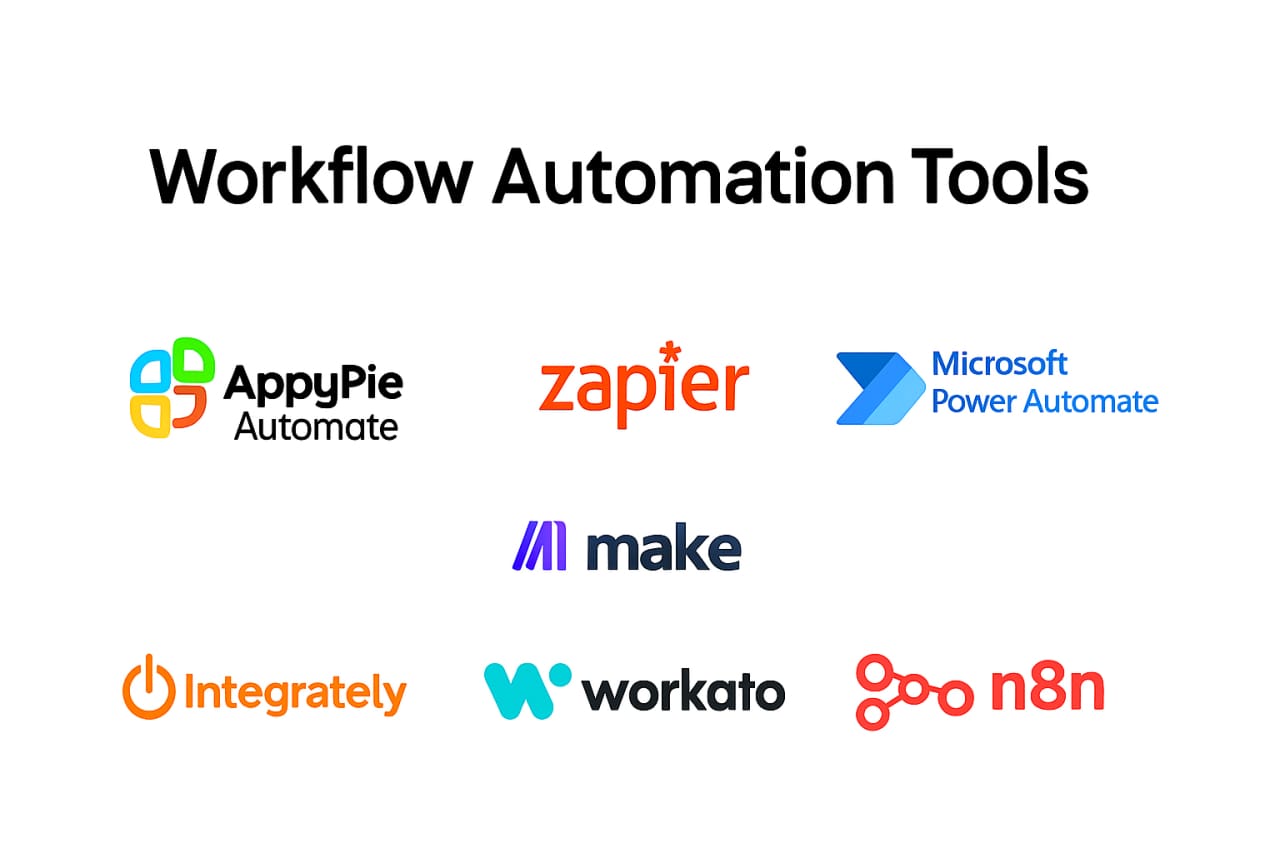Best Workflow Automation Platforms in 2025

In 2025, automation is no longer just a tech trend, it’s a fundamental business strategy. From startups to Fortune 500s, companies are using automation to streamline operations, boost productivity, and eliminate human error. As businesses continue adopting hybrid workflows and AI-based systems, the right workflow automation platform can be the key to efficiency and scale.
Today’s leading platforms don’t just connect apps; they intelligently manage data, automate complex multi-step processes, and adapt to user behavior. Whether you’re a small business owner or a corporate strategist, automation helps you save time, reduce costs, and achieve more with fewer resources.
Here are the 8 best workflow automation platforms in 2025 that are helping organizations stay agile and competitive. For a detailed breakdown, check our complete guide on best workflow automation tools.
1. Appy Pie Automate
Appy Pie Automate leads the 2025 automation market with its powerful AI engine and no-code workflow design. It connects over 600 popular apps including Google Workspace, Slack, HubSpot, Trello, and Mailchimp allowing users to create automated workflows without writing a single line of code.
The platform’s interface is intuitive and highly visual. Users can design custom “Connects” using simple “If-This-Then-That” logic, making automation accessible to anyone. Appy Pie Automate’s built-in AI assistant recommends workflow templates based on your habits, ensuring you never start from scratch.
From lead management and email marketing to file synchronization and CRM automation, Appy Pie Automate handles it all. It also integrates with Appy Pie’s ecosystem of business tools including Chatbot, App Builder, and Live Chat offering a seamless automation experience across multiple functions.
Key Features:
- 600+ app integrations with real-time triggers and actions
- Drag-and-drop workflow creation
- Multi-step automation and data filtering
- AI-based workflow suggestions
- Cross-platform connectivity with Appy Pie ecosystem
Best For: Businesses, startups, and freelancers who want to automate repetitive tasks and scale operations easily.
2. Zapier
Zapier remains one of the most widely recognized names in workflow automation. Known for its extensive app directory and reliability, Zapier connects over 6,000 apps across categories like marketing, sales, CRM, and operations.
Its new AI Workflow Builder in 2025 allows users to describe their process in plain English — Zapier then automatically creates a workflow (“Zap”) for them. This combination of automation and natural language processing makes it easier than ever to automate even the most complex multi-step processes.
Key Features:
- 6,000+ app integrations and custom Zaps
- AI Workflow Builder for natural language automation
- Multi-step workflows with branching logic
- Secure data handling and team collaboration
Best For: Businesses and teams using multiple SaaS tools who need a reliable, scalable automation solution.
3. Make
Make, previously known as Integromat, stands out for its visual, drag-and-drop automation builder. It gives users a clear visual map of how data flows between apps making it easier to create, test, and refine workflows.
The 2025 version of Make includes real-time error tracking and advanced conditional paths, allowing teams to create complex, multi-layered automations. It’s perfect for users who prefer visual logic without deep coding. Developers, however, can still add custom APIs, scripting, and webhooks for deeper control.
Key Features:
- Visual scenario editor with real-time execution
- Multi-path workflows and conditional branching
- Webhooks, API, and data transformation support
- Advanced debugging and error handling tools
Best For: Businesses and developers looking for flexibility and visual clarity in automation workflows.
4. Microsoft Power Automate
Microsoft Power Automate continues to dominate the enterprise automation landscape, especially for businesses already using Microsoft 365. It allows seamless integration with Outlook, Teams, SharePoint, and Dynamics 365 while also connecting with third-party apps.
The platform’s AI Builder brings intelligence to automation by reading documents, extracting data, and triggering actions based on content. It also offers Robotic Process Automation (RPA) for repetitive desktop tasks, combining human and digital workflows into one environment.
Key Features:
- AI Builder for intelligent data extraction
- Integration with Microsoft and third-party apps
- RPA for automating desktop processes
- Enterprise-grade compliance and reporting
Best For: Large organizations and enterprises within the Microsoft ecosystem.
5. Workato
Workato is built for enterprise-grade automation with an emphasis on scalability and governance. Its pre-built “recipes” connect business applications like Salesforce, NetSuite, and ServiceNow, enabling both IT and business users to collaborate efficiently.
Workato’s AI-powered “Workbot” acts as a digital assistant inside platforms like Slack and Microsoft Teams, allowing employees to trigger automations via chat commands. This conversational automation trend makes processes faster and more intuitive.
It also offers hybrid cloud support and strong compliance frameworks, making it a trusted tool for global enterprises.
Key Features:
- AI-powered “Workbot” for conversational automation
- 1,000+ pre-built automation recipes
- Hybrid cloud and on-premise connectivity
- Data security, compliance, and role-based access
Best For: Enterprises that need secure, large-scale process automation across departments.
6. n8n
n8n is an open-source, self-hosted workflow automation tool that gives organizations full control over their data and infrastructure. Its flexible node-based builder allows users to create complex logic flows with custom scripting.
Unlike most cloud tools, n8n can be hosted locally or on private servers, making it a favorite among developers, tech startups, and data teams. Its modular design means you can integrate APIs and extend functionality endlessly.
In 2025, n8n’s hybrid model of open-source freedom and professional-grade scalability makes it one of the most customizable automation platforms on the market.
Key Features:
- Open-source and self-hosted flexibility
- Node-based visual workflow builder
- Built-in scripting and custom node creation
- Full control over data and security
Best For: Developers and privacy-conscious organizations that need full customization and data ownership.
7. Integrately
Integrately focuses on simplicity and speed. With thousands of pre-made workflow templates, users can create automations between popular apps with just a single click.
The platform’s step-by-step automation wizard helps users visualize and edit workflows easily. Integrately’s pricing and accessibility make it especially attractive to small businesses, solopreneurs, and marketers who want to automate quickly without a learning curve.
Despite its simplicity, it supports advanced features like conditional logic, filters, and data mapping, giving power users room to grow.
Key Features:
- 1,000+ app integrations
- Pre-built, one-click workflows
- Multi-step automation and logic branching
- Budget-friendly for SMBs
Best For: Small teams and individuals who need quick, easy, and affordable automation.
8. IFTTT
IFTTT remains a staple in the world of simple automations. It connects apps and devices using easy “If This, Then That” logic, making it accessible to everyone from professionals to casual users.
In 2025, IFTTT’s expansion into IoT automation makes it a bridge between business and personal tools. You can automate Slack notifications, calendar events, or even smart office lighting all from one dashboard.
It’s not built for complex workflows, but it’s unmatched in simplicity and cross-device connectivity.
Key Features:
- Easy applet-based automation
- IoT device integration
- Mobile-friendly interface
- Thousands of ready-made applets
Best For: Individuals or small teams automating simple, repetitive tasks.
Conclusion
Workflow automation has evolved beyond task management; it’s now the foundation of digital transformation. Platforms like Appy Pie Automate, Make, and Microsoft Power Automate are giving businesses the tools to work faster, smarter, and more strategically.
From small teams to global enterprises, automation levels the playing field. It eliminates human bottlenecks, improves data accuracy, and creates room for innovation.
In 2025, choosing the right automation platform isn’t about replacing people it’s about empowering them. Whether you want no-code simplicity, enterprise scalability, or open-source control, these workflow automation tools offer the flexibility and intelligence to help your business thrive.
For an even deeper breakdown of features and comparisons, check out our complete guide on best workflow automation tools and start building smarter workflows today.




